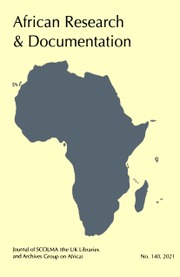Article contents
Africana Personal Papers at Indiana University: issues and questions
Published online by Cambridge University Press: 25 April 2022
Extract
Indiana University (IU) owns several collections of Africana personal papers. In this presentation, I will discuss this conference's theme, that is the research potential of such papers, from a librarian's perspective, based on my work with those collections, and based on research which resulted from this work.
First, a brief overview of IU's collections of personal papers:
While IU's Africana collection in the Wells Library (i.e., the main library) is primarily a working collection, it also includes several collections of personal papers. Probably the most notable among them is the
• H.K. Banda Archive: this archive, dating mostly from the 1950s to the 1990s, was given to us by Dr. Don Brody, the late President Banda's official biographer.
- Type
- Articles
- Information
- Copyright
- Copyright © International African Institute 2010
Footnotes
Special thanks go to Breon Mitchell, Director of the Lilly Library; Elizabeth Johnson, Head of Technical Services at the Lijly Library; and Becky Cape, Head of Public Services at the Lilly Library, for their advice, suggestions, and comments on this paper.
References
- 2
- Cited by


